Ever get the feeling you’re being followed online?
Don’t worry; you’re not being paranoid: it’s been an open secret for years that massive internet companies like Google and Facebook track users across the internet using cross-site tracking cookies and other technologies.
While the intent behind tracking your online behavior isn’t malevolent (the data is usually sold to third parties for use in targeted advertising campaigns), it’s still invasive.
However, you can take measures to prevent these companies from collecting your data and selling it to advertisers, one of which is to use a secure browser when surfing the web.
The most secure browsers have tracking prevention, anti-fingerprinting, and the like, which help keep your browsing sessions private.
Read on as we’ll review the most secure browser apps in this article.
The Most Secure Browsers (Overview)
We’ve included an overview of our top picks below. For detailed information on each pick, scroll down.
The 12 Most Secure Browsers in 2022
The following browsers are some of the most secure and privacy-friendly in 2022.
With one of these options, you can keep your information safe and away from third parties.
1. Tor
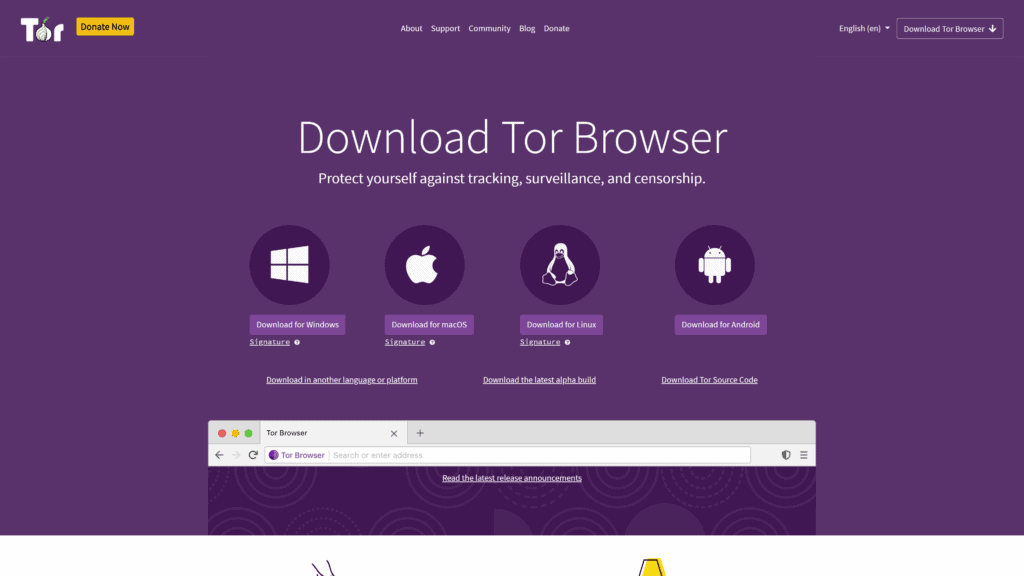
The Tor browser is one of the most secure browsers for anonymous web surfing.
Tor is an abbreviation for “The Onion Router,” which refers to an internet connection method known as onion routing.
Like the vegetable it’s named after, the Tor browser has many layers, with this connection method providing effective tracking protection, privacy, and security.
Tor offers top-tier protection from browser fingerprinting, which is the method of collecting information from websites to help identify your computing device.
Also, this browser can automatically delete browser history and cookie data and conceal your IP address, making it one of the most private browsers available.
Having been created to run on the Tor Network, this browser is one of the few able to access the deep web.
Unfortunately, the browser has earned a reputation among cyber and real-world criminals because of this ability.
Still, Tor has incredible security features, like automatic script-blocking and default blocking of compromisable apps like Flash and QuickTime.
Also, this browser integrates with the HTTPS-Everywhere browser extension for an added layer of security.
The integration means your data will always be encrypted when you visit websites.
The Tor browser has a few setbacks. For one thing, the method it uses to conceal traffic slows down your connection speed.
And the fact that it blocks scripts by default means you might have issues viewing sites like YouTube, which rely heavily on JavaScript.
Still, Tor does what it does well.
And it’s compatible with Windows, macOS, Android, and Linux operating systems.
2. Firefox
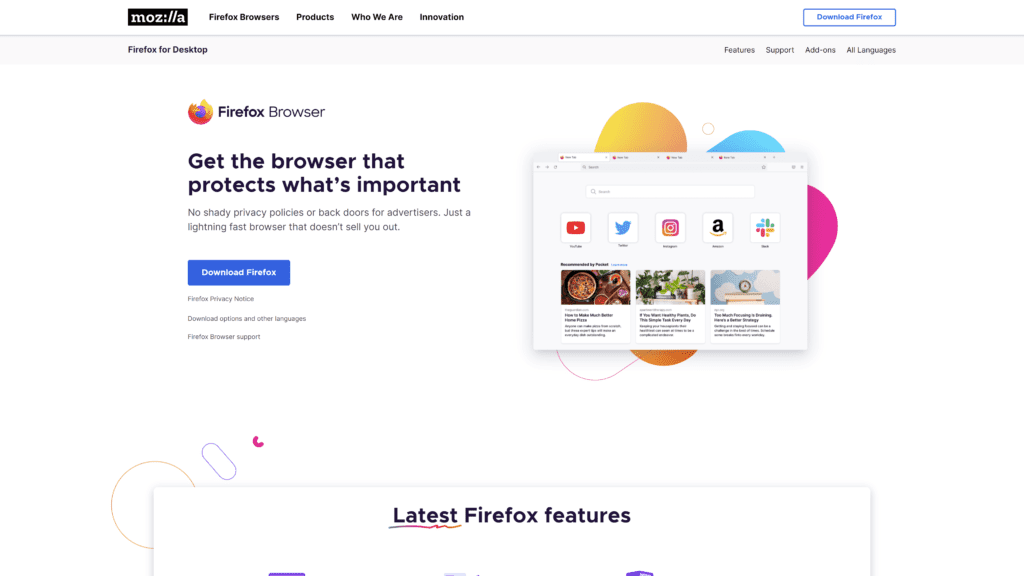
Firefox is the most secure browser among the big four mainstream browsers (the other three being Google Chrome, Microsoft Edge, and Safari).
Unlike the other three web browsers, Firefox is open-source, meaning you can look at its source code if you’re tech-savvy.
Another feature that sets Firefox apart from its peers is it doesn’t track your browsing behavior.
It has built-in pop-up blocking, offers protection from malware and phishing attacks, prevents fingerprinting, and has a private browsing mode.
Additionally, Firefox supports many add-ons that enhance security.
For example, you can add an ad-blocker extension to prevent websites from showing you ads.
Meanwhile, the NoScript Security Suite extension disables Flash scripts and JavaScript from running in your browser, protecting your computer from the vulnerabilities hackers exploit.
Firefox isn’t without issues. Even though this browser is supposed to offer privacy, it has some features that let parent company Mozilla gather information on you.
In particular, the browser’s Telemetry function transmits your performance and usage data to Mozilla.
You can disable it from your browser settings by default, though.
Still, Firefox’s impressive suite of default privacy controls and security extensions makes it the mainstream browser to get if you’re unsure about unfamiliar options.
This browser works on devices with Windows, macOS, Android, Linux, and iOS operating systems, though
3. Brave
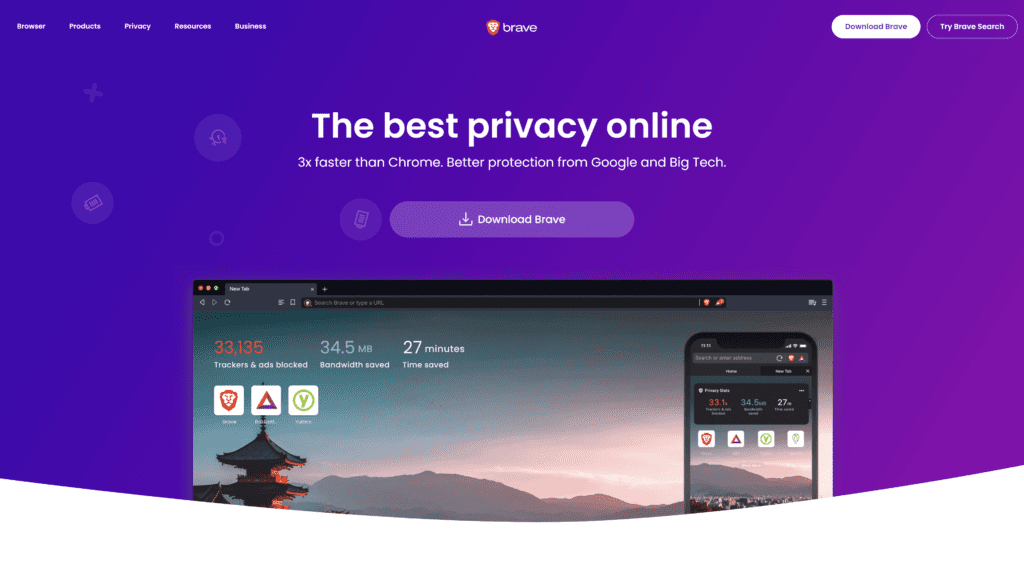
Brave is a browser that uses Google’s chromium code.
However, unlike Google Chrome, Brave is one of the most private browsers you can use to surf the web.
This browser has many features that encourage privacy, like tracking protection, an ad blocker, anti-fingerprinting functionality, a script blocker, and a password manager.
In addition, Brave can automatically upgrade a connection that isn’t secure HTTPS encrypted connection, which is important when giving sensitive information like credit card details, passwords, and so on.
The browser also has a feature called Shield, which prevents websites from placing tracking cookies in your browser. And it doesn’t collect or sell your data.
One of the most exciting features of this browser is it provides the opportunity to earn cryptocurrency, specifically Brave’s Basic Attention Token (BAT).
You can earn BAT coins by viewing ads shown to you on an opt-in basis.
Given the browser doesn’t turn a profit by selling your data, Brave’s ad program is a win-win profit-making method for you and the developers.
Since Google’s Chromium code forms its backbone, the Brave browser is compatible with many Chrome extensions.
Still, you’ll need to be selective, as not all extensions respect privacy.
Regardless, this browser’s built-in privacy features should be more than enough to keep you from being tracked.
The Brave browser is compatible with Windows, macOS, Linux, iOS, and Android.
4. Puffin
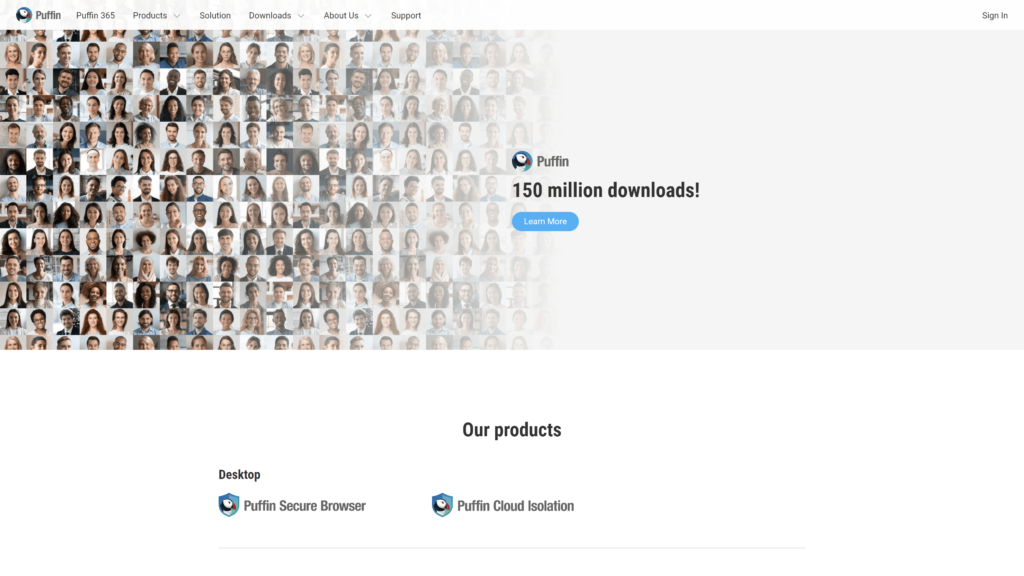
Puffin is an incredibly private web browser that stands out thanks to how it renders web pages.
Traditional browsers make requests to servers and then receive data back in the form of code (HTML, CSS, and JavaScript).
They then render this code, displaying the final webpage to the user.
However, Puffin takes a different approach.
Since this browser is cloud-based, it renders web pages in the cloud.
This means that, unlike with traditional browsers, code from the server never reaches your browser.
This unique approach of rendering web pages in the cloud significantly decreases the risk of downloading malware.
Additionally, you get faster-loading websites, which is always a massive plus among web browsers.
Also, Puffin encrypts your data, offering protection and security features that prevent cyber theft, identity theft, and other issues that crop up when websites don’t secure data.
Of course, Puffin isn’t without issues.
The biggest drawback this browser has is the lack of a feature that hides your IP address.
So essentially, websites might still be able to collect information about you, which may be a huge dealbreaker for the most privacy-focused uses.
Still, that hasn’t stopped over 150 million people from downloading this browser.
5. Iridium
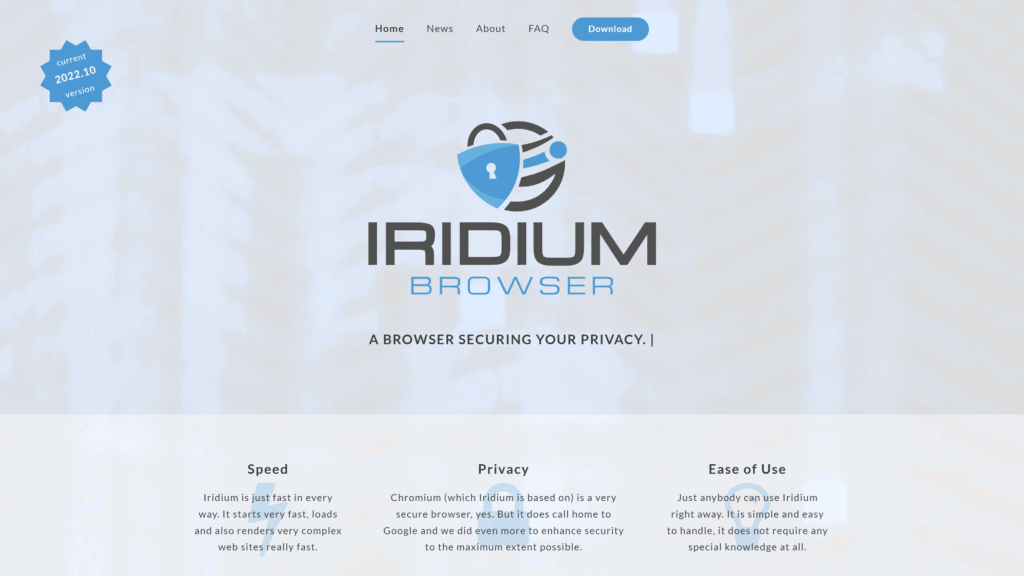
Iridium is a fantastic alternative to Google Chrome.
Like Brave, this browser uses Google Chromium code but is a safer option (privacy-wise) than Google’s flagship browser.
Iridium has many of Google Chrome’s features, like Google Safe Browsing, which is enabled by default.
However, Iridium ups the ante with privacy features.
For example, this private browser blocks third-party cookies, preventing websites from tracking your activity over the web.
Also, it doesn’t store passwords by default and clears site data (for example, in your browser’s local storage) once you close the browser.
And it disables input from autofill by default, keeping login details secure.
Additionally, the Iridium browser doesn’t use the autofill download service.
You’ll appreciate this feature if you share a computer with other people because it means they won’t be able to see your browsing history.
Meanwhile, Iridium offers security in different ways, like disabling many unsupported system-provided plugins (e.g., Flash).
If there’s one aspect where Iridium loses points, it’ll be the browser’s presentation.
Unfortunately, it isn’t as navigable as the browser it’s modeled on, Google Chrome.
Also, this browser confusingly provides the option to log into your Google account, yet the feature doesn’t work.
Presentation aside, Iridium is a worthy Google Chrome alternative if you have privacy needs while browsing online.
It’s available for the Windows, macOS, and Linux operating systems.
6. Bromite
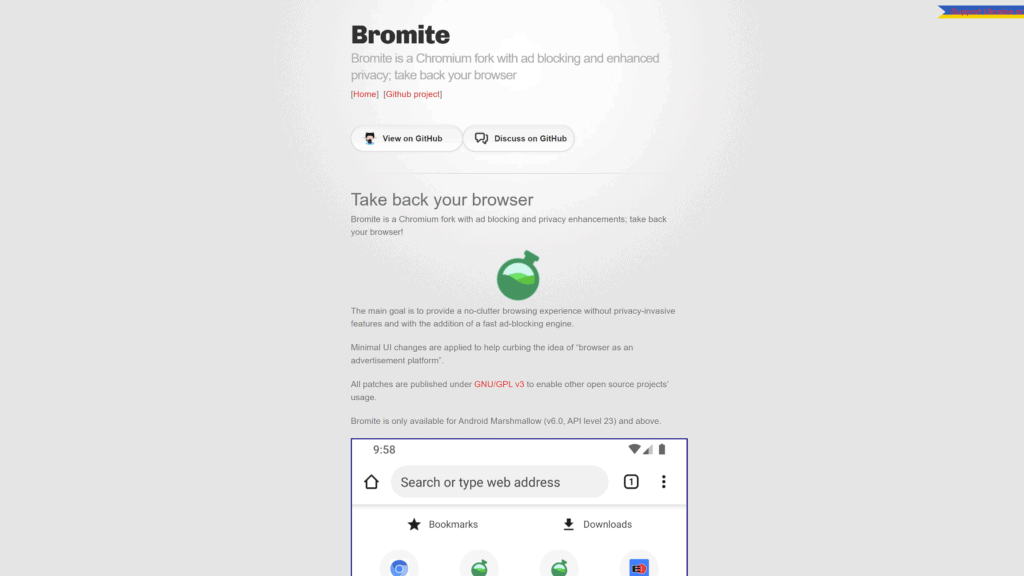
Bromite is a mobile-only browser that’s powered by modified Chromium code.
This is the browser to get if you do most of your web surfing on an Android device.
The developers tout it as offering a “no-clutter browsing experience without privacy-invasive features,” which bodes well for browsing privacy on the go.
This browser has many privacy-enhancing features, including a fast ad-blocking engine and Always Incognito Mode.
Also, it can remove safe browsing and similar features that aren’t very privacy-friendly.
And it removes click-tracking, preventing websites from knowing how you interact with content on their web pages.
Ironically, one of this browser’s strengths is also a weakness.
Like most Chromium-based browsers, Bromite is “ungoogled,” meaning it removes most of Google’s trademark features.
Unfortunately, this characteristic means you won’t even find it on the Google Play store.
You can only use Bromite after enabling its installation via your Android settings, which can be a turn-off for non-tech-savvy users who are afraid of breaking things on their devices.
Still, Bromite’s security features (like its HTTPS-only mode, which is enabled by default) ensures secure site browsing.
So consider this browser if you’re concerned about being tracked when you use your mobile to access the web.
7. Ungoogled Chromium
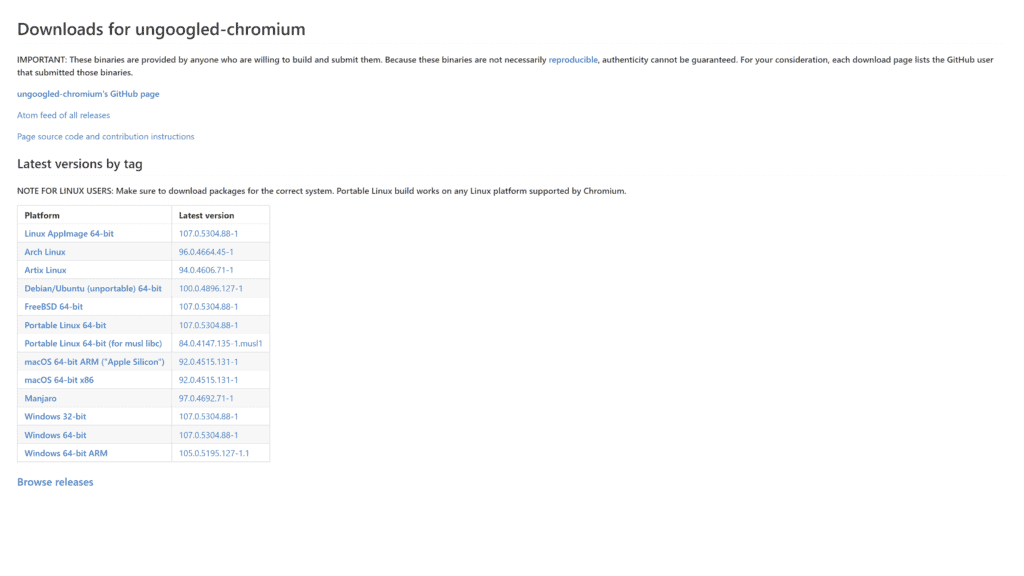
Ungoogled Chromium is another Chromium-based browser on our list of private and secure web browsers.
This open-source browser supports many common Chrome browser extensions while avoiding the privacy issues of the browser it’s based on.
What makes Ungoogled Chromium so ungoogled is its detachment from Google’s default browser.
The browser doesn’t have many of the Google web services, offering a level of privacy you wouldn’t get with Chrome.
For example, services like Google URL tracker and Host Detector aren’t included, preventing your activity on the web from being tracked.
In addition, Ungoogled Chromium disables WebRTC, which was discovered in 2015 as being capable of exposing people’s true internet protocol (IP) addresses, thus facilitating online tracking.
And this browser enjoys regular security updates by virtue of being a Chromium spin-off.
Another feature we like about this browser is how it makes pop-ups open in separate windows.
Pop-ups hurt the browsing experience, so being able to close them without viewing them is a nice touch.
Of course, no browser is flawless, and the same goes for Ungoogled Chromium.
The most prominent flaw we noticed about this browser is it isn’t user-friendly.
In other words, you’ll have to manually activate most of the above-described features, making it one of the most inaccessible browsers for anyone without a tech background.
8. Vivaldi
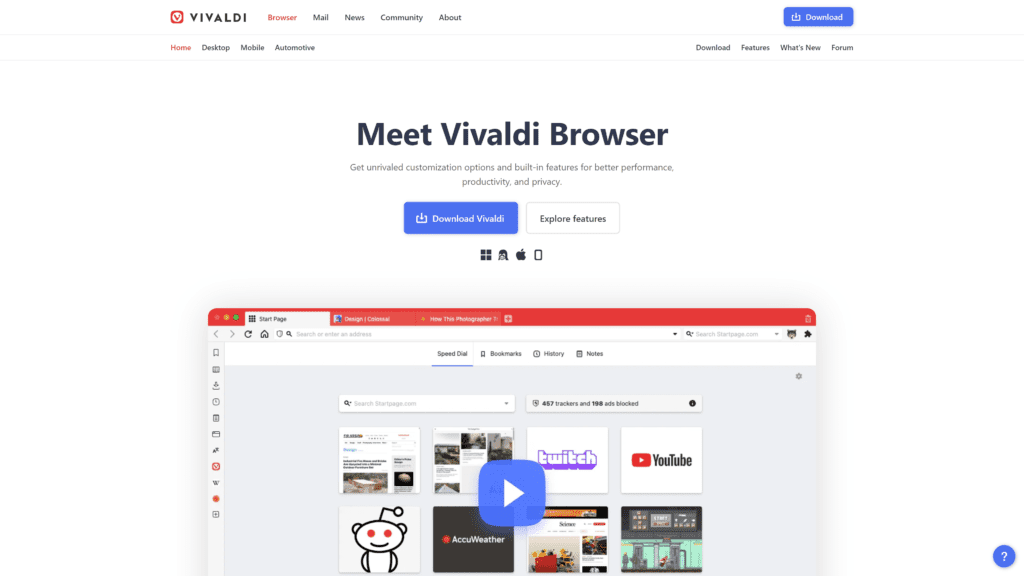
Vivaldi is an excellent browser for anyone who has privacy concerns.
This browser puts privacy at your fingertips.
For example, you can set default search engines to use in normal and private browsing modes and customize the settings for each.
This Chromium-based browser also has common privacy-related features, like ad-blocking, tracker blocking, and protection from web tracking.
And it disables the Idle API, an app commonly used by websites to track how users interact with their web pages (e.g., by keeping track of when they’re idle and active).
Crucially, Vivaldi doesn’t track your behavior.
Instead, the browser blocks pop-ups and reduces dependence on third-party applications by including its own.
Some of these applications include a Vivaldi-specific mail client, note-taker, private calendar, a YouTube-supported feed reader, and many others.
Outside of its privacy capabilities, Vivaldi has many useful features that make the browsing experience more pleasant.
One such feature is its built-in translator, which can translate over 108 languages.
In addition, this browser has a window split screen feature, mouse gesture support, and more.
While this browser has an anti-fingerprinting feature, it isn’t as effective as what you’d get with similar tech.
However, this browser is still among the best for privacy and security.
9. GNU Icecat
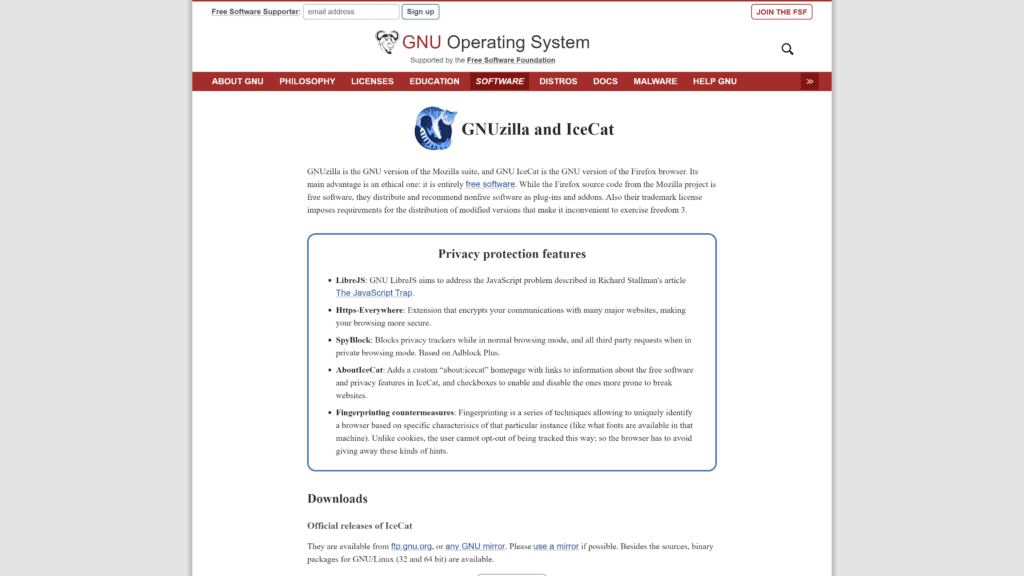
GNU Icecat is a free browsing software based on the Firefox browser.
It comes with many features that help to protect your privacy and make the browsing experience unobtrusive.
In terms of security, GNU Icecat supports the HTTPS-Everywhere plugin, an extension that provides encryption protection for your communications.
So when filling forms with information like your social security number or credit card details, it’ll travel over a secure connection, preventing hackers from stealing this data.
Meanwhile, the browser’s Spy Block feature lets you browse privately in normal browsing mode by blocking privacy trackers.
Additionally, it blocks all third-party requests when used in private browsing mode, keeping your browsing sessions safe from prying eyes.
GNU Icecat provides countermeasures against fingerprinting, a tracking technique you can’t disable.
And the browser’s LibreJS feature prevents the installation of JavaScript programs that other browsers may install without seeking your permission.
The problem we have with this browser is its updates: they’re incredibly slow to roll out and are often years behind competitors’ updates.
10. Safari
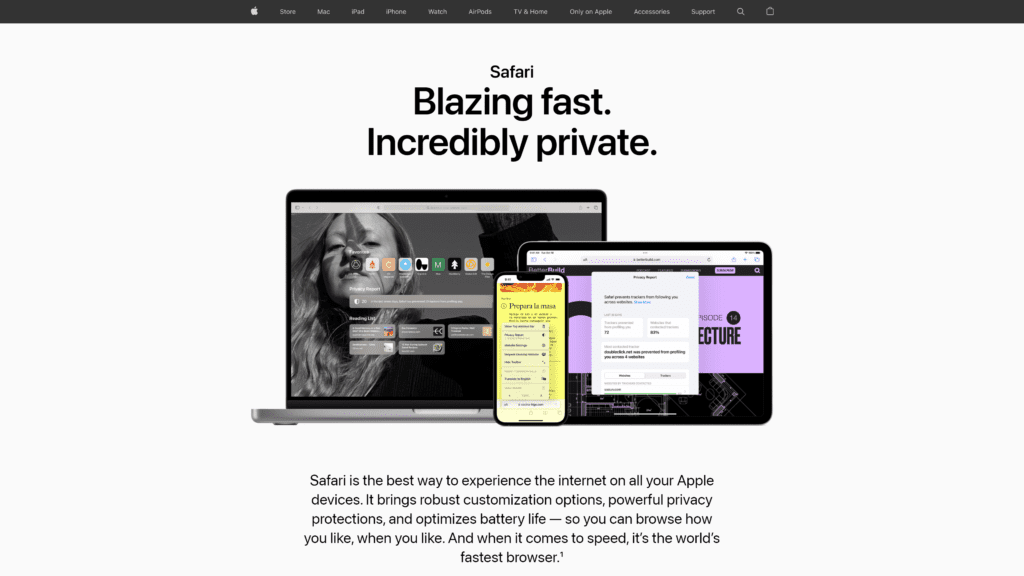
If you own a Macbook, iPhoneor iPad, there’s a chance you use the Safari browser when surfing the web.
Safari is Apple’s proprietary browser, meaning you get it by default with any of the devices mentioned above.
As one of the big four mainstream browsers, Safari is reliable when used for private web browsing.
Apple doesn’t rely on user data like other big tech firms, so the company takes privacy seriously.
Therefore, their flagship Browser is packed with features that keep data private.
For example, Safari has a private browsing mode that uses DuckDuckGo as its default search engine.
Also, this browser has anti-fingerprinting functionality, a password generator, and separated browser tabs that keep malicious code from getting your personal data or destroying your browser.
Even though Apple markets Safari as a privacy-focused browser, it had some issues with privacy in the past.
In particular, Apple was caught collecting users browsing history even when they browsed in private mode.
More alarmingly, some of Safari’s developers are a part of the NSA’s PRISM surveillance program.
Still, as part of the Big Four mainstream browsers, Safari is an excellent private browser for Apple fans.
11. LibreWolf
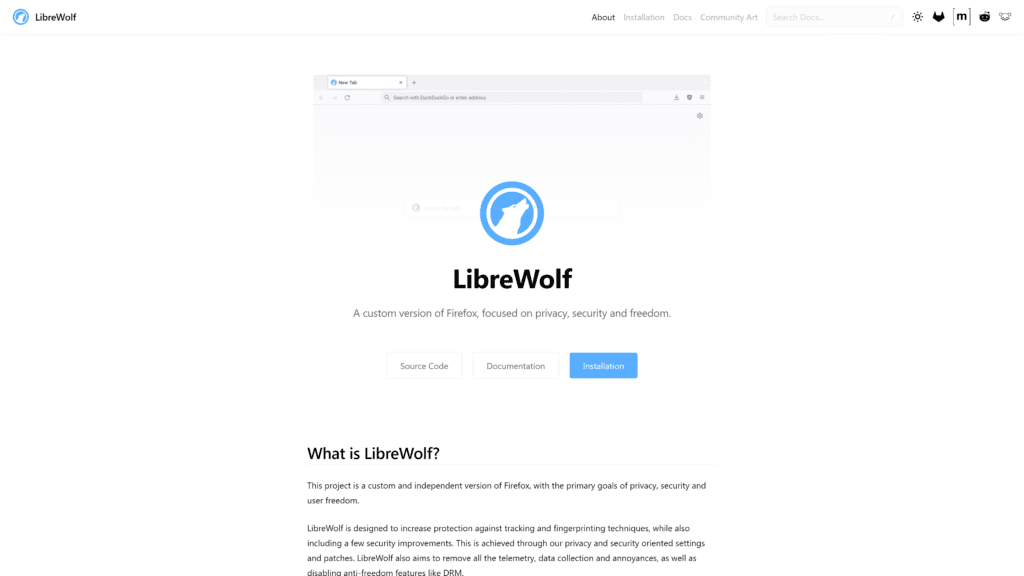
LibreWolf is a customized version of the Firefox browser.
This software project focuses on browser security, privacy, and user freedom.
To meet those goals, the browser’s developers have created a tool that offers protection from fingerprinting and other unauthorized tracking techniques.
If you want to conduct private searches, LibreWolf is an excellent browser to use.
The browser only uses privacy-centric search engines, like DuckDuckGo and Qwant.
And it seamlessly incorporates uBlock Origin, a Firefox extension that blocks ads.
Also, LibreWolf doesn’t include Firefox’s Telemetry feature, which, as earlier described, sends your performance and usage data to Mozilla.
The browser wasn’t made to collect data from internet users, so you don’t have to worry about your search history falling into the wrong hands.
Because the developers use the latest version of Firefox when updating this browser, LibreWolf enjoys regular updates.
As such, it’s a secure browser, offering protection from hackers and data thieves.
The only issue we feel this browser has is that its updates aren’t automatic, so you’ll have to seek out and install newer and improved versions manually.
Thankfully, you get regular push notifications that let you know when updates become available.
The LibreWolf browser is available on Windows, Linux, and macOS.
There’s also an old, deprecated version for OpenBSD.
12. Epic
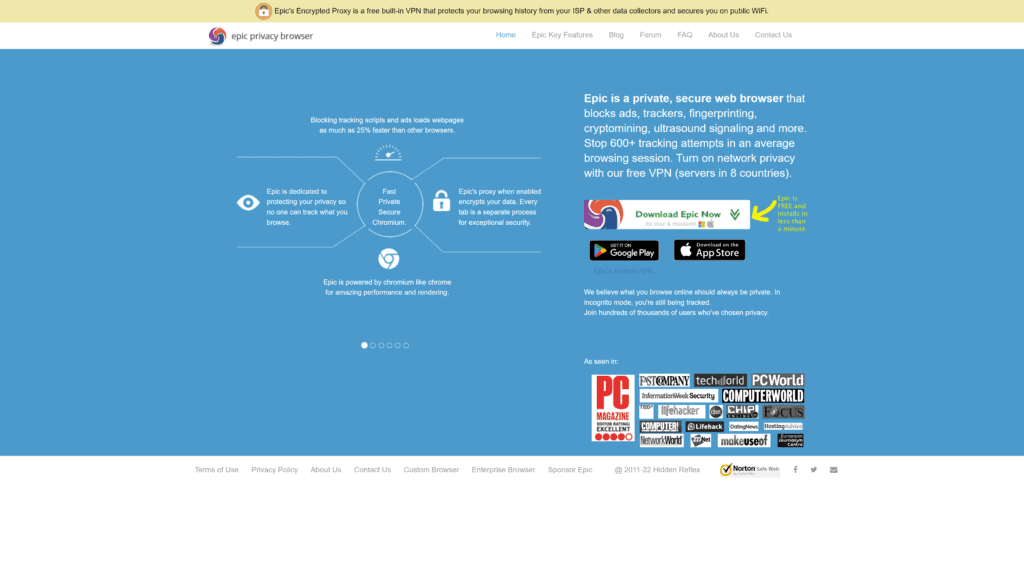
The Chromium-based Epic browser offers privacy from the get-go.
All of its privacy features set to “on” when you first download it, meaning you don’t have to tweak the settings before using it.
Epic blocks cookies, ads, and pop-ups.
Also, it sends “Do Not Track” requests automatically, preventing websites from tracking you.
In addition, the browser uses DuckDuckGo as its search engine by default, making it a privacy-friendly browser.
This browser doesn’t store any of your information, either.
For example, it doesn’t store your browsing history, login details, card information, or other personal data.
And it conceals your IP address (preserving your location data) by blocking RTC calls.
Chrome users looking for privacy alternatives will also appreciate that this browser blocks cookies by default.
Better yet, you can keep track of how many cookies it’s blocked.
The main issue with this browser is it isn’t open-source, unlike other Chromium-based browsers.
As such, only its developers know how private it is.
However, it remains a fantastic entry in our list of private browsers.
The Epic browser works for Windows and macOS.
Choosing a Secure Browser – What to Look For
If you’re looking for browsers that offer secure web browsing, you’ll need to consider the following factors.

1. Cookie Blocker
Tracking cookies are the most common method websites use to gather information on you.
Most sites you visit will seek your consent (through a pop-up) before placing a tracking cookie in your browser.
However, a few don’t bother with these pleasantries, instead gathering information on you long after you’ve clicked away from the page.
Your chosen browser should have a built-in cookie blocker that blocks cookies by default.
This feature will prevent the above-described nefarious websites from tracking your online behavior without first getting your consent.
2. Fingerprinting Protection
Fingerprinting is a sophisticated data-gathering technique Internet giants use to collect information from browsers.
Unfortunately, this tracking method is exceptionally invasive and involves creating a unique profile on users based on factors like computer hardware, fonts, screen lighting settings, and more.
When choosing a browser, ensure that it has anti-fingerprinting technology to prevent websites from gathering this information.
3. HTTPS-Only Mode
The Hypertext Transfer Protocol (HTTP) forms the backbone of the World Wide Web.
In a nutshell, it governs how computers connected to a network (in this case, the internet) communicate.
HTTPS (where the “S” stands for “Secure”) improves on HTTP, ensuring computers communicate over a secure network.
A browser that includes an HTTPS-only mode offers higher security than one that doesn’t.
That’s because the connection is encrypted, preventing other people from tracking your visited pages and stealing sensitive information like passwords and credit card credentials.
4. Ad and Popup Blocker
The main reason internet corporations try to gather your data is so they can sell it to third-party advertisers.
These advertisers then show you targeted ads that can make you feel like they know everything about you.
While not essential for privacy, an ad blocker can give you a sense of privacy.
Additionally, a pop-up blocker can prevent sketchy pop-ups from opening in your browser window, potentially protecting you from harmful viruses.
5. Operating Systems
If you surf the web using multiple devices and want private browsing on all of them, you should consider a browser with high operating system compatibility.
For example, you may own a PC but browse on an Android device when out and about.
Many private browsers are compatible with Windows, macOS, Linux, Android, and iOS operating systems.
Choose browsers compatible with the OSs on your devices so that your information remains private at home and on the go.
6. Browser Extension Compatibility
Finally, consider downloading a browser that supports extensions.
Even though you’re looking for alternatives to Chrome and other mainstream browsers, you wouldn’t want to pick a browser that doesn’t support helpful browser extensions.
That said, do your research when downloading extensions to ensure they don’t have security vulnerabilities and data collection tools.
Frequently Asked Questions
Is Google Chrome a Secure Web Browser?
Google Chrome has many security features built-in.
The most notable ones include predictive phishing technology, which prevents you from falling prey to phishing attacks, automatic download scanning, and a safety check feature that alerts you when malicious extensions have compromised your saved passwords.
How Can I Browse Without Being Tracked?
You can prevent sites from tracking activity by enabling your browser’s Do Not Track setting.
You can find the setting in most mainstream browsers’ “Privacy and Protection” menu section.
Alternatively, use a secure browser with numerous privacy-centric features and enhanced tracking protection like Tor.
Does the Firefox Browser Collect and Sell User Data?
While Mozilla uses Firefox to collect statistical data for sale, the company doesn’t collect information about individual users like other search engines and big tech companies.
Wrap Up
As this article shows, online privacy isn’t beyond your reach.
Different web browsers have features that prevent unauthorized data collection, some of which turn this functionality on by default.
Additionally, many of the options we discussed are free software you can easily download and install and most are compatible with every major operating system.
If you’re looking for a secure browser, you can’t go wrong with Tor.
It’s the best browser for keeping your browsing data and identity safe online.
Meanwhile, Mozilla Firefox and Brave browsers are excellent alternatives for user privacy.







